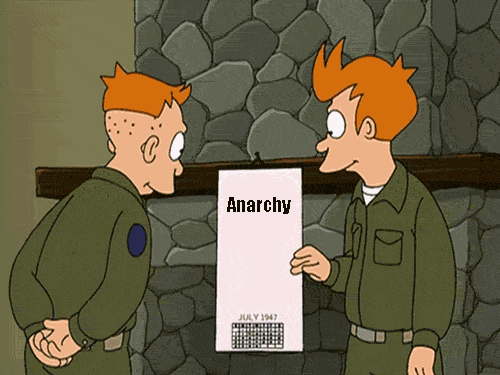Blockchain voting is a dream shared by many, libertarians and bitcoiners alike. Ideology aside, blockchain voting is safe, transparent and cheap. It also seems to be inevitable.

EVMs and blockchain
In principle, electronic voting machines (EVMs) should not be demonised. Their concept also targets efficiency and prevention of tampering and human error. The EVMs, however, are not innocent either. An average user has absolutely no clue how they operate or that they can make, or be made to make, mistakes, just like any other piece of computing equipment. For the more tech-savvy among us, the problem is not the lack of understanding of the technology, but of access and transparency, since commonly EVMs use proprietary software. Hence, Gregory Wonderwheel expressed his frustration on Medium commenting on the Spencer Gundert’s controversial post:
“Until the codes are open-sourced, there should be no electronic voting machines. Allowing private companies to count our votes with secret programs is just stupid as well as anti-democratic. Paper card stock ballots that are counted by machine are okay, since they can be hand counted to verify the machine count accuracy in close races.”
The US case is particularly problematic. A year ago, the Brennan Center for Justice at New York University School of Law published a much-quoted study entitled America’s Voting Machines at Risk.
####“No one we talked to predicted there will be a vast meltdown of all, or even most, of the nation’s voting equipment in 2016. Aging machines do not all fail at once on a single day. But many argued that unless and until equipment is replaced, we will increasingly see problems from aging equipment that have already been occurring more frequently than they should — flipped votes, freezes, shut downs, long lines, and, in the worst case scenarios, lost votes and erroneous tallies,” wrote authors Lawrence Norden and Christopher Famighetti.
Among its findings the study stated two major security concerns:
####“Older machines can also have serious security and reliability flaws that are unacceptable today. For example, Virginia recently decertified a voting system used in 24 percent of precincts after finding that an external party could access the machine’s wireless features to record voting data or inject malicious data.

Smaller problems can also shake public confidence. Several election officials mentioned “flipped votes” on touch screen machines, where a voter touches the name of one candidate, but the machine registers it as a selection for another.”
It is against this background that blockchain entrepreneurs have started developing their own solutions, and Blockchain Technologies Corp. (BTC) is one of the companies that have advanced most in the field.
According to the company’s recent blog post, the voting machines currently used during elections in the US are “out of date, insecure, difficult to use, and largely supplied by a single vendor whose vote-counting software is proprietary .”
The BTC’s solution involves a paper ballot that carries a unique identifier, an especially designed machine that scans the ballot offline and burns the data on a DVD, and a blockchain where the results are permanently recorded. What BTC has been particularly successful in is gaining experience. While the first ever political party to use blockchain-based e-voting was the Danish Liberal Alliance, which conducted an internal vote on 22 April 2014 during its annual meeting, the Libertarian Party in the US has recently employed BTC services on at least two occasions.
First, it facilitated voting during the Texas Libertarian Party Convention in San Antonio in April 2016. In an interview to SovereignBTC, Nick Spanos, Founder and Head of Blockchain Technologies Corp. and Founder of the New York City Bitcoin Center, described the variation of blockchain voting used during the convention.
The printed paper ballots used were then registered onto the florincoin and bitcoin blockchain. In principle, the paper ballot can have a private key on it, noted Spanos. But, in order to preserve the voter’s anonymity, which in this case was specifically requested by BTC’s clients, the ballot must not include a private key. Each ballot still has a unique identifier, however, not necessarily in the form of a QR code. The bottom line is, Spanos emphasised, that we need to separate the ownership of the private key from the ballot itself, in order to prevent the selling of the vote.
Most recently, in the beginning of May, BTC organised the voting procedure during the New York Libertarian Party Convention. On this occasion, a variation of BTC’s system was implemented. The voting was observed and commented upon by Spencer Woodman for The Verge:
“The principles that underlie Blockchain Technologies’ proposed solution are fairly simple. In the system Spanos deployed over the weekend, a voter fills out a paper ballot that’s marked with three QR codes, that assign it a unique blockchain identity. Once scanned, the company’s system routes the digitized vote to the candidate’s "wallet," and the Blockchain record begins to expand. After voting, public versions of the blockchains are released for open inspection (although, as in traditional elections, voter’s identities are not tied to ballots).”
Earlier in February, BTC recorded into a blockchain the raw reporting results of Iowa caucus precinct captains.

Blockchain voting
The idea (and the ideology) behind blockchain voting, however, extends further than electronic voting machines and the US presidential primaries. In February, Ukrainian and US blockchain entrepreneurs signed a memorandum to develop an Ethereum-based e-voting system. In April, Russia’s central securities depository announced that it had successfully tested a distributed ledger e-proxy voting system.
Moreover, Scott Wiener and Chris Jerdonek advocated for a “fully transparent voting system” for San Francisco, arguing that “by building an open-source system, San Francisco would no longer be locked in to a single vendor” and that “once developed and certified, the system could benefit not just San Francisco but the entire country.”
At the same time, a newly established Australian political group called the Flux Party, whose founders Max Kaye and Nathan Spataro are both blockchain enthusiasts, promotes distributed ledger voting as a core element of the upgraded version of democracy it seeks to establish.
Already in March 2014, Cristopher Malmo wrote that merging democratic software such as LiquidFeedback, Helios or Ethelo with blockchain “for security and verifiability is where it could get interesting for bigtime, official democracy.”
“It would be possible to see how many votes were cast, voters could verify that their own votes were counted, and the decentralized network would be the best answer so far to hacking attempts. Combined with the political thought that's gone into systems like Liquid Feedback, there's a starting point here for putting political questions to the public much more frequently and ambitiously,” Malmo stated.
Blockchain voting certainly holds an enormous potential in terms of transparency and distribution of power, thanks to its open source nature. Nevertheless, perhaps it is wiser not to see blockchain as a panacea for election fraud and the failures of democracy. Or, to put it in Cristopher Malmo’s words from back in 2014:
“Would e-voting solve all these problems or be perfect? No. Would it be better than our current system? Quite possibly. It's that chance that makes experimentation worth trying.”

Diana Bogdan. Democratic and efficient: Is blockchain voting our future?
We are coinfox.info
We hope that you will appreciate our work.
We will be happy to hear your comments and suggestions.
Do you know Follow My Vote?
As a libertarian, I don't like democracy because libertarians always lose.
But even if we have democracy, there is no reason to use EVMs. Pen, paper, voting booth and ballot box is superior technology because it's so simple. Traditional voting can be done even in really bad situations when there is no electricity.
EVM/blockchain voting is not cheap. Developing a reliable system will cost way more than pens and papers do. Traditional voting is much more cheaper and truly efficient.
EVM/blockchain voting will be so difficult to understand that average citizens can't comprehend how it really works, which means that they can't be sure if the election was fair. If there is any suspicion that the election was tampered, democracy loses it's legitimacy.
If there is a provable and easy way to check afterwards that the vote has been recorded as intended, it will create markets for vote buying. If there's not, then there is no way to know if blockchain voting was done fairly. Anonymous voting is impossible with electronic solutions.
And you have to also understand how bad the computer security is currently. It's not only software but also hardware. It's really, really hard to find a device that couldn't be compromized by hackers or intelligence agencies. Most of the devices that citizens own can be hacked. If those devices are used to vote, it will be possible to tamper the results of elections.
E-voting would be amazing. The problem is, there are enemies to the decentralization of power as those with everything want to keep it that way. They'll come up with garbage arguments such as "voter privacy" to counter e-voting proponents - we all know they have zero interest in voter privacy and only interest in maintaining their disproportional privileges with which to exploit everyone else.